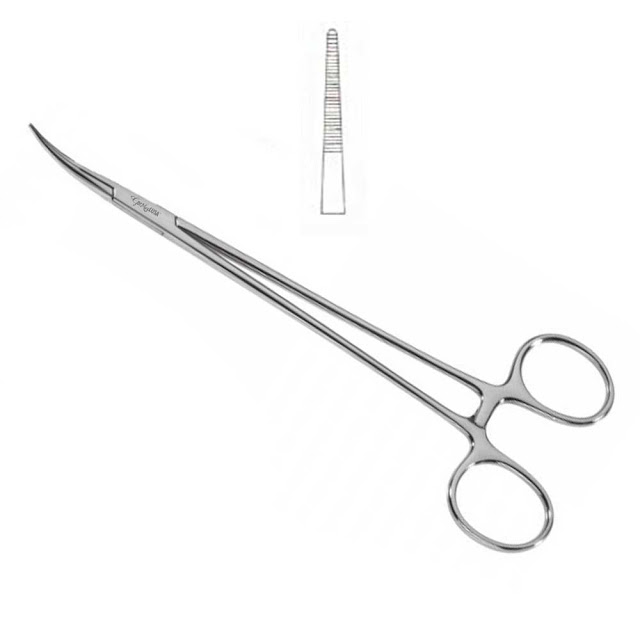Forceps are one of the most important tools in surgical procedures, it is used to hold,grip and manipulate tissues.
These forceps come in a variety of shapes and sizes depending on the type of procedure and function they need to perform. Surgical forceps are one of the most useful tools that can help surgeons perform surgeries efficiently.
In several surgical procedures, forceps are commonly used to grip and manipulate tissues, clamp blood vessels, and remove foreign bodies. Several operations need the use of medical forceps, including:
Laparoscopic and Open Surgery
Dental treatmentsObstetrical techniques
Neurosurgical procedure
Ophthalmic Surgeries
Cardiovascular procedures
Cosmetic/Plastic surgery
Surgical forceps types and procedures they are used for:
Forceps are available in a number of types, each of which is intended to serve a particular function. The most typical types of forceps and the procedures they are used for are listed below:
Adson Forceps
Adson forceps have tiny, pointed teeth on the tips of their handles and are commonly used in microsurgery and plastic surgery procedures. They are perfect for delicate tissue dissection because they provide a solid hold without damaging the tissues.
Artery Undermining Forceps
These forceps, which are widely used in cardiovascular surgery, are designed to grasp and manipulate arteries. The tips of these instruments can be straight, curved, or angled, and they are used to clamp blood arteries during treatments.
Bainbridge Forceps
These forceps are unique due to their hinged joint, which allows them to grip tissues at an angle. They are frequently employed to hold delicate tissues in place during urological and gynecological operations.
Crile Forceps
The crile forcep is one of the most popular types of forceps. Their rough jaw design, provides a firm grip, makes them ideal for grasping tissues during surgery.
Dandy Forceps
Dandy forceps are long, slender, and have a curved tip, making them ideal for achieving difficult-to-reach surgical locations. They are often used in neurosurgery and ophthalmological operations.
Benefits of Using Surgical Forceps
Using forceps for a variety of medical procedures has a number of advantages. Among the main advantages are:
Increased Precision and Control
The forceps are made to provide surgeons more control and precision when doing surgery. Thus, fragile tissues can be handled and moved more precisely, improving the effectiveness of surgery.The control these forceps provide helps in better surgical performance.
Minimized Surgical Time
Employing forceps can help shorten surgical times by giving tissues a firm grasp and facilitating tissue manipulation during procedures. This can assist in cutting down on the overall time required for a surgical treatment, lowering the chance of problems, and improving patient outcomes.
Less Blood Loss
By clamping blood arteries and controlling bleeding, forceps can minimize blood loss during surgery. This can lessen the chance of consequences like anemia, blood clots, and infections.
Reduced Tissue Damage
Forceps help in reducing tissue damage during surgery when used properly. Forceps may help in lowering the risk of scarring, inflammation, and other complications by giving tissues a firm grasp and causing the least amount of damage to neighboring tissues.
Lower Infection Risk
Forceps are usually made of high-quality components and are intended to be sterilized before use. By ensuring that the tools are free from dangerous germs and other pathogens, this helps to lower the risk of infection.
Better Surgical Outcomes
The use of forceps can help enhance surgical outcomes by delivering more precision, control, and minimal tissue injury. This may result in shorter recovery times, less discomfort, and more patient satisfaction.
Risks Related to Surgical Forceps
Although using forceps surgical instruments has many advantages, there are also a number of risks involved. Some of the possible risks and issues are as follows:
Forceps can cause tissue damage or necrosis, which is the death of living tissue, if they are used incorrectly or too violently. This could lead to infections, poor healing, and other issues.
Using forceps in close proximity to nerves increases the risk of nerve damage or injury, which can result in numbness, discomfort, or a loss of function in the affected area.
If forceps are not completely sterilized before use, they may introduce harmful bacteria and other pathogens into the surgical site, raising the risk of infection.
Bleeding can occur when forceps are used inappropriately. This kind of bleeding can be difficult to stop and might require additional surgical intervention.
Wrap-Up !
Choosing the right set of surgical forceps for a particular surgery is essential because they are an essential equipment in the healthcare industry. GerMedUSA is one of the leading producers of surgical instruments, including forceps. They make their equipment using superior materials and with the specific needs of surgeons in mind. Because of their vast selection of surgical instruments and commitment to quality, GerMedUSA is a fantastic choice for buying surgical supplies.

Post a Comment